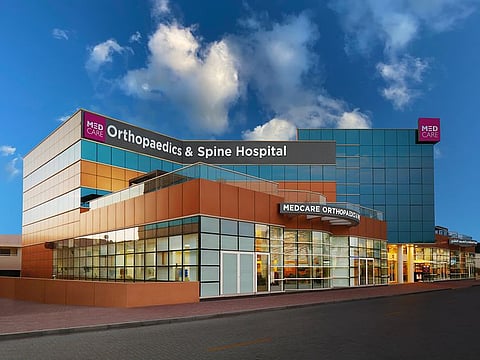Advances in spine surgery reduce recovery and rehabilitation periods
Robotic and minimally invasive surgeries will become the standard for spine surgery

Spine surgery usually conjures up images of complicated open procedures that lead to debilitating pain, lengthy recovery periods and ugly post-surgery scars. But experts at Medcare say that advances in medical technology have resulted in comparatively comfortable operations that cause minimal pain.

What these tiny cuts do is give the surgeon access to the spine without damaging the surrounding tissues and skin, resulting in largely scar-free wounds. Because of the precision of MISS, the recovery period is greatly reduced as well.
MISS is the future of spine surgery, says Dr Thaer Darwish, Consultant Neurosurgery, Centre of Excellence – Spine Surgery at Medcare Orthopaedics and Spine Hospital. “We firmly believe that in five years’ time, robotic surgery will become the standard for spine surgery. Robotics and MISS are already an important part of the field and will definitely continue to be crucial towards the success of spine surgery.”

However, surgery for both neck, back and spinal complaints are generally the second or third line of treatment, say both doctors. Dr Darwish explains that only if all other therapeutic interventions – such as oral medicine and physiotherapy – fail to provide any relief that the patient is recommended surgery. It is a rare case when surgery is recommended as the first line of treatment, and that depends on the cause, strength and type of pain one is experiencing. The type of surgery will then also determine the duration on the operating table.
When one must undergo surgeries, say for the neck – another spine-aligned procedure – the latest technique comes with fewer side effects. “The traditional method of neck surgery includes relieving the compressed nerves and fixing the bones together to fuse over time,” Dr Abolfotouh explains. “With the evolution in spine surgery we are now able, when fitting certain criteria, to do the same without fusing any bones but rather by using artificial discs, which preserves big part of the patient's neck mobility.”
This ease of movement and full recovery is aided when patients dutifully follow doctors’ post-op lifestyle change orders. “We recommend the post-surgical period be full of healthy habits such as no smoking and drinking, using proper lumbar and ergonomic support when sitting, standing, or lying down, and following the surgeon’s and physiotherapist’s care recommendations,” says Dr Abolfotouh. “All of these ensure proper healing and minimal pain during the recovery period.”
It’s also important to address the pain factor during recovery, for many fear that they will become dependent on painkillers. “[The] painkillers that we prescribe after spine surgery often belong to the opioid class of drugs and although they can be addictive, we work with our patients to ensure that the addictive nature of the medications isn’t taking over the patient’s recovery period,” assures Dr Abolfotouh.
With all the advancements made by the industry and tech employed by Medcare, Dr Darwish insists that patients need not consider a trip abroad for spine surgery anymore. “Spine surgeries are all available locally. Medcare Orthopaedics & Spine Hospital offers state-of-the-art facilities equipped with the latest technology and expert spine surgeons, for excellent patient care, within the country.”
This content comes from Reach by Gulf News, which is the branded content team of GN Media.